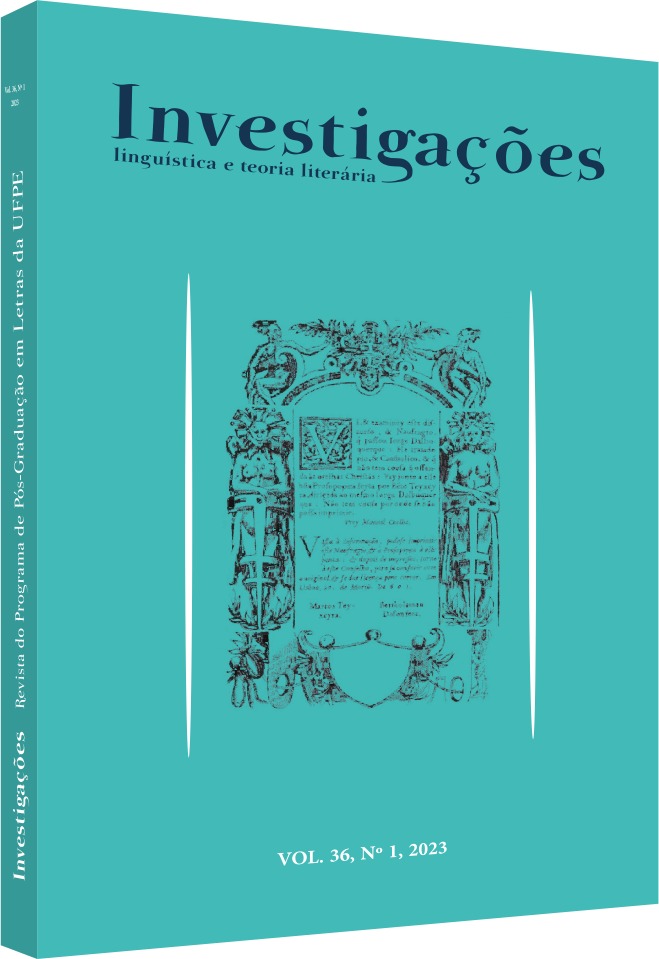Between remembering and forgetting in Chicos que Vuelven
DOI:
https://doi.org/10.51359/2175-294x.2023.258501Keywords:
Chicos que vuelven, Mariana Enriquez, disappeared, archive, memoryAbstract
This article presents an analysis of the actions of remembering and forgetting in "Chicos que Vuelven" (2011) by Mariana Enriquez. The construction of the archive of missing children and adolescents in Buenos Aires constitutes a key experience in the tense relationship experienced by civil society and subjectivities in the narrative. Drawing from the works of Derrida (2001), among others, we understand that the interweaving of the notions of archive and memory alludes to a recent traumatic past of the nation and disrupts any attempt to restore order in the present time, subjecting this population to a collective paralysis.
References
ARFUCH, Leonor. La vida narrada: memoria, subjetividad y política. Villa María: Eduvim, 2018. E-Book.
CARROLL, Noel. Filosofía del terror o paradojas del corazón. Madrid: A. Machado Libros, 2005.
CLIMENT, Dalva Desirée; PIMENTEL, Ary. O fantasma da ditadura militar argentina: análise de textos de Mariana Enriquez. Anais... In: Anais do X CONGRESSO INTERNACIONAL DE LÍNGUAS E LITERATURA. Campina Grande: Realize, 2021. p. 1-15.
DERRIDA, Jacques. Mal de arquivo: uma impressão freudiana. Tradução: Cláudia de Moraes Rego. Rio de Janeiro: Relume Dumará, 2001.
DRUCAROFF, Elsa. Los prisioneros de la torre. Buenos Aires: Emecé, 2011.
ENRIQUEZ, Mariana. Chicos que vuelven. Villa María: Eduvim, 2011. E-Book.
ENRIQUEZ, Mariana. Todas las cosas que perdimos en el fuego. Barcelona: Anagrama, 2016. E-Book.
ENRIQUEZ, Mariana. Los peligros de fumar en la cama. Barcelona: Anagrama, 2019a. E-Book.
ENRIQUEZ, Mariana. Ese verano a oscuras. Buenos Aires: Páginas de Espuma, 2019b. E-Book
ENRIQUEZ, Mariana. Nuestra Parte de Noche. Barcelona: Anagrama, 2019c. E-Book.
ENRIQUEZ, Mariana. Alguien camina sobre tu tumba: mis viajes a cementerios. Barcelona, Anagrama, 2021. E-Book.
ENRIQUEZ, Mariana. El otro lado: relatos, fechicismos y confesiones. Barcelona: Anagrama, 2020. E-Book.
ENRIQUEZ, Mariana. Bajar es lo peor. Barcelona: Anagrama, 2022. [on-line].
FIGUEIREDO, Eurídice. A literatura como arquivo da literatura brasileira. Rio de Janeiro: 7 Letras, 2017.
GASPARINI, Sandra. Últimas inflexiones de la narrativa argentina de terror: las novelas de Celso Lunghi. Estudios de Teoría Literaria. Revista digital: artes, letras y humanidades, [s.l.], v. 7, n. 13, p. 51-59, mar. 2018. Disponível em: <https://fh.mdp.edu.ar/revistas/index.php/etl/article/view/2422>. Acesso em 9 out. 2021.
PRADO, Esteban; FERRANTE, Lucio. Devenir Americano Del Terror Argentino. Un Diálogo Crítico Con Franco Bifo Berardi. RECIAL, v. XI, n.17, on-line, jan./jun. 2020. Disponível em . Acesso em 20 set. 2022.
RICŒUR, Paul. Tempo e Narrativa. Tradução: Márcia Valéria Martinez de Aguiar. Revisão da tradução de Claudia Berliner. São Paulo: Editora WMF Martinz Fontes, 2010.
SARLO, Beatriz. Tiempo pasado. Cultura de la memoria y giro subjetivo. Una discusión. Buenos Aires: Siglo XXI Editora Argentina, 2007.
SARLO, Beatriz. Tiempo presente: notas sobre el cambio de una cultura. 2. ed. Buenos Aires: Siglo Veintiuno Editores, 2010.
VAX, Louis. Arte y literatura fantásticas. Buenos Aires: Eudeba, 1965.
Downloads
Published
How to Cite
Issue
Section
License
Copyright (c) 2023 Adriana Binati Martinez

This work is licensed under a Creative Commons Attribution 4.0 International License.
Authors who publish with Revista Investigações agree to the following terms:
Authors retain copyright and grant the journal right of first publication with the work simultaneously licensed under the Creative Commons Attribution 4.0 International (CC BY 4.0) license that allows others to share the work with an acknowledgement of the work's authorship and initial publication in this journal.
Authors are able to enter into separate, additional contractual arrangements for the non-exclusive distribution of the journal's published version of the work (e.g., post it to an institutional repository or publish it in a book), with an acknowledgement of its initial publication in this journal.
You are free to:
Share — copy and redistribute the material in any medium or format for any purpose, even commercially.
Adapt — remix, transform, and build upon the material for any purpose, even commercially.
The licensor cannot revoke these freedoms as long as you follow the license terms.
Under the following terms:
Attribution — You must give appropriate credit , provide a link to the license, and indicate if changes were made . You may do so in any reasonable manner, but not in any way that suggests the licensor endorses you or your use.
No additional restrictions — You may not apply legal terms or technological measures that legally restrict others from doing anything the license permits.

